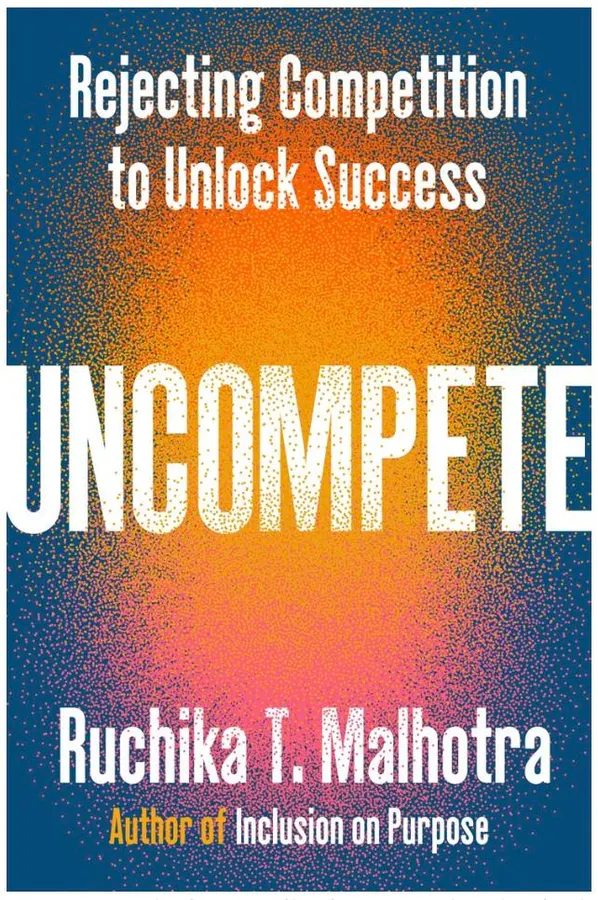Copyright forbes

We're told competition is good for us. It motivates excellence, drives innovation, separates the best from the rest. From childhood sports to corporate promotions, the message is clear: compete or fall behind. In her new book, Uncompete, Ruchika Malhotra demonstrates that competition isn’t making us better. It's making us sick. Penguin Random House But Ruchika Malhotra, founder of global inclusion strategy firm Candour and author of the new book Uncompete: Rejecting Competition to Unlock Success, argues we’ve been sold a lie. Competition, she contends, isn’t making us better – it's making us sick. "It's so subtle and yet so pervasive," Malhotra tells me in a recent interview. "It's fascinating because for years, this idea has been in my head. It's one of those rules of engagement that I think we just take for granted. It's understood that if you want to get ahead, if you want to make something of yourself, even for people who are impact-driven leaders, there is still an unspoken rule that you gotta be better than the others." Even in fields that pride themselves on collaboration (nonprofits, academia, social impact work) the competitive undercurrent remains. "There's still an assumption that even if I don't have to have sharp elbows, one of us will be better though," she notes. The Invisible Water We Swim In What makes competition so insidious is precisely how normalized it has become. Unlike burnout, which society is finally beginning to question, competition still operates largely beneath our conscious awareness. MORE FOR YOU "I think with competition, it's still very subtle. It's still under the skin and requires us to go deeper," Malhotra explains. "But when you do, you realize like, oh my gosh, it's everywhere." Unlike burnout, which society is finally beginning to question, competition still operates largely beneath our conscious awareness. The system is designed this way. "So much of the way the world has been set up has been to create that sense of like someone is better than the other, that there is more hierarchy, that there will always be a goal that we won't achieve that someone else has achieved," she says. The promised benefit? That competition makes us better, pushes us to excellence. But Malhotra's research reveals the opposite effect: "What it actually does is it creates a deep sense of insecurity, of loneliness, of this idea that I'm not good enough." This manifests early. Children raised in intensely competitive environments typically go one of two ways, Malhotra observes: they either derive all their self-worth from achievement, leading to anxiety and depression, or they never discover their actual talents because those gifts don't fit the narrow definition of what "counts" as success. The Automatic Competitive Response Perhaps nowhere is this more visible than in how quickly professional relationships can turn adversarial when opportunities arise. "For years or months, you've been great friends," Malhotra says. "And suddenly it's like sharp elbows out." Consider a common scenario: you and a colleague are both up for the same promotion. The automatic response is to compete: to position yourself as better, to distance yourself from your friend, to treat this as a zero-sum game. But Malhotra invites us to slow down that knee-jerk reaction. "Do I really want it? What am I getting? What am I losing? Is the relationship more important? Is there other ways that we could reimagine this? Can I talk with my leaders about like, does it have to be this?" The goal isn't perfection or completely eliminating competitive instincts. "I would love for it just not to be the default knee-jerk sort of reaction to every situation," she emphasizes. "Just slow down that automatic process." The Body as Battleground One of the most powerful – and difficult – chapters in Uncompete addresses embodiment and rest. For Malhotra, this was personal. "It was really hard for me to write that chapter," she admits. "As a woman, as a person of color, you are taught that your body doesn't belong to you. And it's not only you, it's centuries of being taught that your body doesn't belong to you. It is a tool of capitalism. It is a tool of other people getting ahead." This manifests in the relentless pressure to produce, whether in the paid workforce or as unpaid caregivers. "We are totally expected to be dissociative with our bodies and constantly be in production in one way or the other in the service of someone else," Malhotra notes. Resisting this expectation is radical – and necessary. Drawing on the work of scholars like Dr. Tricia Hersey (author of Rest is Resistance) and Dr. Sandra Dalton-Smith's framework of seven types of rest, Malhotra argues that rest is more than sleep. It includes spiritual rest, sensory rest, and the fundamental act of saying: "For a short while, even in a world that denies me this, my body belongs to me." She points to ancient cultures that understood this intuitively. "I write about the naps that happened at my grandparents’ house in India growing up," she shares. Short afternoon rests weren't laziness—they were an assertion of bodily autonomy in a world that constantly demands more. Perhaps most striking is Malhotra's observation about where competition hits hardest: "The most common object of the competition is me," she notes. "And nowhere more than for women and our bodies." When Scarcity Is Real – And Resistance Is Essential Malhotra is clear-eyed about the challenges facing marginalized communities. For women, people of color, and those at intersections of marginalization, competition hits differently because scarcity is real, not imagined. "It's just so much harder when it comes from a real place of scarcity that we've been shown," she acknowledges. "It's not imagined." But she argues this makes the work of "uncompeting" even more essential. "Part of the resistance and the work is to say, like, do I really need to conform to this?" The framework she offers in Uncompete rests on five principles: collaboration, an abundance mindset, radical generosity, inclusion, and solidarity. These aren’t just feel-good values – they're strategic choices that create better outcomes for individuals and organizations. Making the Shift Malhotra offers specific practices for moving from competition to collaboration: Reframe comparison. Transform envy into self-reflection. When someone else succeeds, acknowledge they've earned it and reflect on areas where you've earned your own wins. Create abundant communities. Build relationships over transactions. Amplify others vocally, share opportunities, create communal wins rather than zero-sum victories. Redefine success on your own terms. Measure success by what makes you feel whole – through play, possibilities, patience, and kindness – rather than external markers of achievement. The shift isn't about abandoning all structure or competition entirely. It's about making it conscious rather than automatic, intentional rather than reflexive. A Matter of Survival As our conversation draws to a close, I ask Malhotra what she most hopes readers take away from Uncompete. Her answer is modest but profound: "I want us to just slow down that automatic process." That's it. Not a complete overhaul of personality or career. Not perfection. Just awareness of when the competitive instinct kicks in, followed by a pause to ask different questions. "Do I really want it? What am I getting? What am I losing? Is the relationship more important?" These simple questions can fundamentally shift how we navigate professional and personal decisions. For Malhotra, this isn’t just theory. It's survival strategy. "I think it's a matter of survival as far as I'm concerned right now for us as individuals and for our collective," she reflects. In a world that increasingly feels zero-sum, where anxiety and burnout have reached crisis levels, where relationships fray under the pressure to constantly prove our worth, the invitation to "uncompete" offers something radical: the possibility that there is actually room for all of us to succeed. Not by climbing over each other, but by building together. Not by treating our bodies as production machines, but by reclaiming rest as resistance. Not by accepting competition as inevitable, but by slowing down long enough to ask: Does it have to be this way? The answer, Malhotra suggests, is no. And that changes everything. You can watch the interview with Ruchika Malhotra that informed this article here. Editorial StandardsReprints & Permissions



